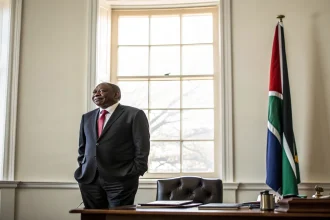Claude Malhuret has launched a fierce verbal attack against the American president in a series of statements that have reached millions of viewers. The sharp criticism, which has gained significant traction online, draws on Malhuret’s extensive political career and experience.
Malhuret, a member of the French Senate, did not hold back in his assessment of the current US administration, delivering what observers describe as a “scathing critique” that has resonated with audiences both in France and internationally.
Political Impact and Public Response
The verbal assault has quickly gained traction across social media platforms and news outlets, with viewership numbers reaching into the millions. Political analysts note that such direct criticism from a foreign legislator represents an unusual diplomatic situation, particularly given the traditionally strong alliance between France and the United States.
The timing of Malhuret’s comments comes amid ongoing discussions about transatlantic relations and several points of tension between European nations and the United States on issues ranging from trade to defense spending.
“These statements reflect growing frustration among some European politicians with certain aspects of American foreign policy,” said one international relations expert who requested anonymity due to the sensitive nature of the topic.
Malhuret’s Background and Credibility
What gives Malhuret’s criticism particular weight is his extensive political background. Before his role as senator, Malhuret served as the mayor of Vichy from 1989 to 2017. His career also includes humanitarian work as a former president of Doctors Without Borders (Médecins Sans Frontières), giving him substantial international experience.
Malhuret’s political journey includes:
- Service in the French Senate since 2014
- Nearly three decades as mayor of Vichy
- Leadership role in international humanitarian efforts
- Experience in both domestic and foreign policy matters
This combination of domestic political experience and international humanitarian work provides Malhuret with a unique perspective on global affairs and American leadership that many viewers find credible.
Diplomatic Fallout
The French government has not officially commented on Malhuret’s statements, maintaining a careful distance from the senator’s personal views. The American embassy in Paris has similarly refrained from direct response, though sources suggest diplomatic channels have been active behind the scenes.
Political commentators are divided on whether Malhuret’s comments will have lasting impact on Franco-American relations or simply represent a momentary flash point in an otherwise stable alliance.
“When a respected political figure with Malhuret’s background speaks so forcefully, it cannot be easily dismissed as mere rhetoric,” noted a French political analyst. “His words carry weight because of his experience and standing.”
The viral nature of Malhuret’s criticism highlights the changing landscape of international diplomacy, where individual political figures can bypass traditional channels and speak directly to global audiences through digital platforms.
As the situation develops, observers will be watching closely for any official response from the American president or administration officials. For now, Malhuret’s pointed critique stands as a notable moment in recent transatlantic discourse, demonstrating how personal political statements can quickly gain international significance in today’s connected world.









